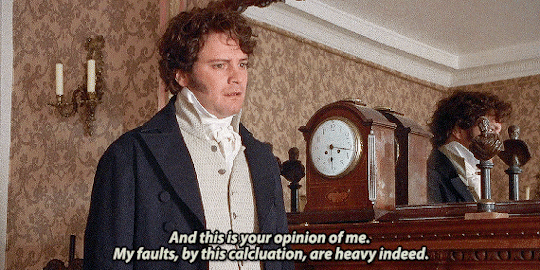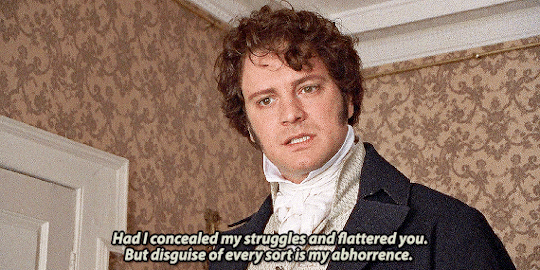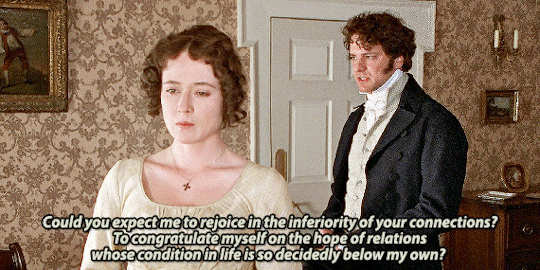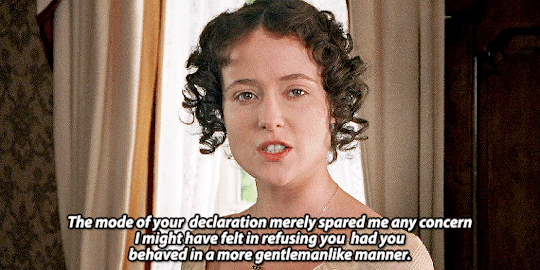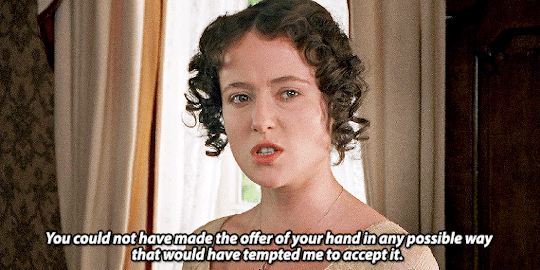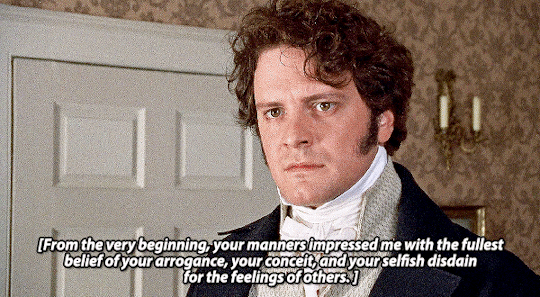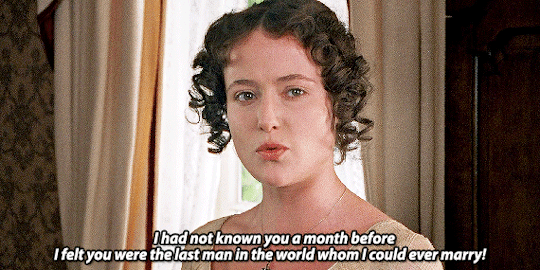Text
Your INFJ Care and Handling User Guide and Manual
Your INFJ Care and Handling User Guide and Manual
This manual is part of a series of guides originated by @intpboard
Congratulations! You have come into the possession of your very own INFJ unit, probably through a poetry slam at an underground coffee shop. In all likelihood, they have only offered you this manual after you expressed your intense love for Fight Club and organic tea. Give yourself a pat on the back for earning their trust.
Your INFJ unit will come equipped with the following accessories:
One (1) emotional sponge
Two (2) everyday outfits
Two (2) old man/history teacher/librarian outfits
One (1) Harry Potter outfit inspired by their house
Two (2) bookshelves fully stocked with books and sentimental knickknacks
Two (2) cabinets of herbal tea
One (1) set of Star Wars movies on BluRay
One (1) animal companion
Three (3) unrealistic plans for their life
Infinite (∞) deep thoughts, ideas, and questions
Infinite (∞) unfinished projects
Software:
Your INFJ will come preprogrammed with the following traits;
Ni: Your INFJ will frequently freeze due to its complex thoughts, but don’t worry, INFJ will always return to share its inner workings. Unless it has to do with their feelings. (See Troubleshooting pg 6) You may find that your INFJ is psychic. This mode is only installed on some units, but do not be alarmed if it is installed on yours. It is still in beta, so be wary of predictions. Your INFJ may struggle to talk in non-symbolic language. If your INFJ warns you not to do something, it is advised to listen.
Fe: INFJ units consider everyone’s emotions but their own, and it is an essential part of caring for them to help them relieve their own emotions. INFJs often put on different personas to avoid conflict and to put others at ease. This may come across as fake or masking their own values, but this is, in fact, on of their values. Your INFJ will motivate you and make you feel important, but often forgets to do so for themselves.
Ti: This function filters the Fe function, making sure that your INFJ is being logical. Beware INFJ door slams, often when your INFJ is in a Ni-Ti loop. (See Troubleshooting pg 7) The INFJ door slam is almost impossible to override, and once you’ve lost your INFJ’s trust it will be very hard to regain it. However, it is very hard to cause a doorsl as INFJ’s are very patient.
Se: This function only works in certain modes, but it allows your INFJ to act quickly in. A certain context. Your INFJ’s Se function allows them to quickly bring in new information for Ti to process and categorise. Se will either function properly to balance Ni and ensure the Ni’s ideas are feasible, or it will malfunction and cause Ni burnouts.
Getting Started:
1. Place cup of tea (preferably from their collection) next to your INFJ.
2. Put a book of poetry in your INFJ’s hands.
3. Set your INFJ’s animal companion next to them.
4. Allow your INFJ to charge by reading and cuddling their companion.
5. If step 4 does not work, initiate a conversation about psychology with your unit.
6. If your INFJ still doesn’t start, take them to a dusty bookshop and allow them to roam for 4+ hours.
Modes:
Deep (default) - Asks too many questions. Zones out only to excitedly return and talk about dinosaurs and stars. May accidentally talk in cryptic symbolism.
Therapist - Activated when confronted with emotions. Uses hugs and possibly the Sarcastic mode to cheer you up. Will sit with you quietly until you are emotionally stable and then bombard you with questions, water, and food.
Sarcastic - Activated usually when in a boring situation. Uses Ti to make very funny, sometimes cutting remarks on the stupidity of the topic.
Protective Dad Friend - Activated after Therapist. Will beat anyone who hurts you with a bat. Will not let you stay in a bad relationship. Overly protective.
Closed off science nerd - Overly excited about elements and Newton’s Three Laws of Motion. Will lock themselves in their room and read 42 Wikipedia pages. Activated when around NT units.
Relationships with other units:
NFs: Often activates Protective Dad Friend and Therapist modes. INFPs may feel devalued by INFJ, but will get along eventually.
NTs: Gets along well when in Sarcastic mode or Closed off science nerd. Good for bouncing ideas off of. NTs check the feasibility of INFJ’s ideas.
SJs: Difficult to communicate between each other, especially when INFJ is in Closed off science nerd mode. INFJ enjoys how responsible and put together SJs are.
SPs: INFJs appreciate SP’s spontaneous and fun loving nature. SPs may overwhelm your INFJ with their sensing function.
Feeding:
Your INFJ may forget to eat when in the following modes: Closed off science nerd, Therapist, Protective Dad Friend, and Deep. Notice that they may forget to eat in their default mode, so feed them at least two (2) times daily. Your INFJ will not die if left to fend for its own food, but it may shut down temporarily.
Grooming:
Your INFJ will groom regularly if it has a duty such as school or work. Your INFJ may forget to groom if it has an extended break. Make sure to remind them of mundane tasks like brushing teeth and hair, changing their clothes, and showering.
Sleeping:
Your INFJ unit will try to convince you and themselves that they do not need sleep. Do not listen to them. They need at least four (4) hours of sleep. INFJs have a tendency to be insomniacs when in their default mode.
Frequently Asked Questions:
Help! I lost my INFJ in a bookstore/coffee shop/similar venue!
Your INFJ is probably hiding from other humans, or engaging in a deep conversation with an old man. Fear not, they will come find you in no longer than 2 hours.
Do I get to keep my INFJ?
Yes, probably! INFJs often bond for life, both platonically and romantically! Once you have established a relationship with INFJ it is hard to get rid of them. But be careful of the INFJ door slam.
I left my INFJ alone for a weekend and now they’re shut down. What do I do?
Refer to Getting Started. If you have a well established relationship with your INFJ, perhaps integrate cuddling/hugging into the Getting Started process.
Again, congratulations on your newly acquired INFJ unit!
55 notes
·
View notes
Text
Your INFP ‘Companion’ unit User Guide and Manual
Your INFP ‘Companion’ unit User Guide and Manual
This manual sanctioned by and concept credit to @intpboard ;)
CONGRATULATIONS! Somehow you have found a wandering and bewildered INFP. Evidently they have offered you this manual after hearing you support Sherlock and their OTP. Take a moment to feel good about yourself, this is an important step in your relationship.
Your INFP companion will come with the following accessories:
Three (3) diaries (CAUTION: Perusal unadvised. Touch these at your own risk)
Three (3) everyday outfits
Two (2) indie outfits
Two (2) Tumblr blogs
One (1) laptop
One (1) mobile device
One (1) pair of custom-built earphones
One (1) unique tea mug
One (1) cat
Software:
You INFP comes programmed with the following traits:
Fi: Your INFP is a special snowflake. They will have invisible feels, but keep an eye out for the cute smile. And they probably really do Know that feeling.
Ne: Your INFP is weird and likes ambiguous things. May meme occasionally.
Si: Your INFP likes to store up good memories and database feelings like buried treasure for that novel they’re writing.
Te: Although it is their inferior function, your INFP can be executive and use cold hard logic to be remarkably strong and creative. They may need help adapting to the harsh outside world. May secretly hate everything (including themselves) if unhealthy.
Getting Started:
To set up your INFP companion:
1. Fill mug with tea and place INFP in close proximity of cat and a sunset and leave to bask until heart is pleasantly warm.
2. Sync with Tumblr (this should happen automatically through a deep emotional connection inherent in all INFPs, much like Bluetooth).
3. Allow thirty (30) minutes of continuous data exchange.
4. Sit beside them for thirty (30) minutes in silence as Human Presence Conditioning.
5. Get up. If your INFP moves to follow, they have successfully activated and synced with you. If not, repeat Step 4 with the cat.
Modes:
Quiet (default) - quiet cinnamon roll. May stare off into space, usually either very sweet or very sarcastic, depending on your model. May be a socially awkward if brand new. Be careful not to forget about or leave behind your INFP when it is in this mode.
Talkative - frequent activation of this mode usually correlates with quick Human Presence Conditioning. Explore topics until you find which ones activate this mode, you may be surprised.
Feels - may need unusual amount of solitude with all accessories in easy access. Be receptive of feels if expressed, to avoid software crashing.
Crazy/happy - have fun, roll with it, but beware of hazard unwariness.
Unhealthy/shadow (locked) - only activated under extreme stress. May burn everything in its path, or burn self in solitude.
Relationships with other units:
NFs: Your INFP’s homey home. May feel threatened or devalued by INFJ units due to social constructs, but usually end up getting along.
SPs: Interesting territory for your INFP. May find Se overwhelming, but generally find them intriguing, perhaps from a distance.
NTs: May or may not get along, if they do, have very interesting discussions, good for software conditioning. May be cut by perceived coldness if new.
SJs: Can be very fun. INFP gets to feel like an educator in Ne, and may learn from high Si if healthy. Some of these usually necessary for grounding your INFP during lightning storms.
Feeding:
Your INFP may be constantly snacking. A ‘regular’ diet is not strictly necessary, but sneak some vitamins into their packet and fetish foods occasionally.
Grooming:
Some INFP units require more grooming than others. If your INFP excessively self-grooms, it is probably not just a phase (see Bjork). You have little to no control over this.
Sleeping:
Your INFP companion unit runs the risk of becoming nocturnal. Discover the cause for this - usually either angst or creativity. If the former, see Troubleshooting (p. 9). If the latter, arrange bedside outlets - NOT tumblr.
Frequently Asked Questions:
Why does my INFP procrastinate so much?
Unlike INTPs, INFP units have Te software, however it is in its beta version upon unit activation and the full version can be installed after some conditioning. Engaging them in tasks they have a personal investment in and using Divide and Conquer applications may aide effectiveness.
Why is my INFP so sensitive to criticism/so defensive/so salty?
See above question (Te software). INFP units also have an Identity Crisis application that is hosted by Fi, activated by ‘negative’ external stimulus and executed by Te. With the full version of Te, this application can lead to powerful self-transformation. Sensitivity should decrease with conditioning, however positive affirmation will help stabilize application launch.
Help! My INFP unit is stuck in Unhealthy / Shadow mode!
There are three main manifestations of unhealthy mode. If in shadow functions, an ENFJ may be helpful. If in the grip of Te, they may need help coming to terms with reality. Often fire and brimstone anger and ‘just do it’ mentality can help pull your INFP out of apathy long enough to grow healthier. If in an Fi-Si loop, thrust you INFP into a new situation, or several. In any case, getting your INFP to communicate their problems to other units (other NFs are usually best) will be highly beneficial, although your INFP’s Fi may resist initially.
Again, CONGRATULATIONS on acquiring your new INFP unit! Have fun!
(via intpboard)
1K notes
·
View notes
Text
ISFP Care and Handling User Guide and Manual
This manual is part of a series of MBTI user guides initiated by @intpboard
Congratulations! You’ve managed to coax an ISFP out of their favorite hiding spot! Here’s a handy guide for taking care of and getting to know your quirky and mysterious new friend.
Your ISFP comes with:
Ten unique and interesting clothing items
Two sets of worn and comfy clothes
One animal friend
One collection of inspiring photos and/or random objects that are meaningful to your ISFP.
One set of closely held moral beliefs and values
Custom upgrades: Your ISFP will have multiple creative interests. Books, sports equipment, musical instruments, camping gear, cameras, various art supplies, and random junk may also be included.
Software
Your ISFP comes preprogrammed with the following traits:
Fi: Makes your ISFP unit independent and sensitive. They may appear aloof or distant, preferring to process their emotions on their own. They’re actually very warm, loyal, and supportive when you get to know them. Your unit also has a strong moral compass will refuse to do anything that conflicts with their values. Contrary to popular belief, your ISFP is capable of changing their views, but forget trying to force them into doing it!
Important note: Each ISFP will have Fi values, morals, and beliefs that are unique to them. You will need to adapt this general user guide to your specific ISFP Unit.
Se: Your ISFP is very in touch with their physical world and enjoys using their five senses to explore and express themselves. They can be impulsive and adventurous, preferring to live in the moment rather than plan too far ahead. Se also makes them witty and charming and surprisingly cute.
Ni: Your unit will have the need to search for deeper meaning in their life. They will frequently “have a feeling” about a plan or a person that they will feel compelled to act upon, but not be able to explain. Also makes them incredibly self-critical and may induce occasional bouts of self-doubt.
Te: Your unit may have many dreams, but probably won’t get around to actually accomplishing most of them (without help, anyway). They can also be stubborn at the inopportune times and unintentionally (and hilariously) blunt when asked to give their opinion.
Getting Started
Sit your ISFP in a quiet room, preferably near a window.
Set the animal friend in ISFP’s lap.
Leave ISFP alone for several hours to adjust to their surroundings and bond with the animal friend.
Offer ISFP cookies and initiate conversation about the animal friend.
If ISFP doesn’t start, take them to a nearby park and let them wander for a while.
Modes
Cinnamon Roll Mode (default): Soft, sweet, and bashful. Prefers to listen to you talk and observe you quietly. Notices everything and knows your favorite food, what kind of car you drive, and probably where you live even though they never asked. (No, it’s not creepy! They just overheard you giving directions to someone else and didn’t want to bother you needlessly.) Will make you quirky, adorable (and sometimes baffling) gifts to demonstrate their affection.
Creative Mode (default): Your ISFP has a nearly unmatched creative brain and will often find beauty in their environment. If you don’t really understand (Yes I’m talking to you NT types) just voice your support and point out one or two things about their art (or song, or sport, or hobby, or project, or handmade gift/peace offering) that you like. Your ISFP will be flattered and happy that you appreciate their talents and are involved.
Adventure Mode: Your ISFP unit will live for meaningful adventures, and often express longing for the freedom or ability to try new experiences and visit new cultures or sights. Actual chance of them acting on these desires is 50/50, but your ISFP will spend a lot of time daydreaming about it nonetheless.
Sensory Recharge Mode: Your ISFP unit may go dormant after a large social event or adventure. While they enjoy sensory activities, they easily become overstimulated and need time to themselves to process everything they’re taking in. Forget trying to have conversations with your unit while they’re in this mode; they’ll quickly excuse themselves and hide.
Angry Toddler Mode: Activated under stress. Your ISFP has become so emotionally overwhelmed (usually due to feeling they are not Good Enough™) that they just can’t handle any more. Symptoms include grouchiness, outright refusal to eat or engage in normal activities, and uncharacteristic outbursts of anger. Gently relieve your ISFP of any pressing responsibilities and give them space to express their feelings without judgement.
Relationships with Other Units
NF: ISFP enjoys relationships with NF types, drawn to their emotional depth and idealism. In friendships with these types, ISFP is free to discuss creative ideas and dream big. ISFP will also go to these types for emotional support in times of need.
NT: Your ISFP may not initially gravitate towards NT individuals, as they often don’t understand their rational nature. However, they are intrigued by the intellect and personality quirks of NT types.
SJ: Your ISFP will want to ride through the glen on their mighty steed, firing arrows into the sunset while the SJ in question will probably want them to calm down, organize, and behave themselves. If not handled carefully, this can result in conflicting goals and thus, stressful relationships.
SP: Your ISFP unit will be most at ease with fellow SPs. They can go on spontaneous adventures together and your ISFP unit is guaranteed to have a couple in their social circle. (Also the #1 culprit when your ISFP randomly disappears.)
Feeding
Your ISFP unit will have an unusual diet and eating schedule. Mealtimes and snacks tend to happen when ISFP finds it convenient. Don’t worry about regular meals, your ISFP likes and appreciates food and will make sure that they are eating when they need it.
Grooming
ISFP is very particular about their appearance. When it comes to hygiene, they tend to stick to the basics, but can be relied upon to take care of themselves. However, If you want them to be on time for something important, remind them to prepare beforehand.
Sleeping
Your ISFP will flip-flop between intensely creative periods where they will forego sleep to work on projects (or go adventuring), and “catch-up” periods where they will sleep through the day to recharge. Don’t interrupt your unit’s sleep times, as this may activate Angry Toddler Mode.
Frequently Asked Questions
My ISFP won’t activate (talk), now what??
Stop trying so hard! You can’t force an ISFP to be your friend. Chances are excellent that ISFP picked up on your efforts to connect from the beginning and is well aware of your intentions. Give them time to observe you and gently coax them out with non-aggressive, non-threatening communication (or fun. Or cookies. Or compliments. Or kittens).
Also, keep in mind that silence isn’t necessarily an indicator that your ISFP doesn’t like you. Often it just means that they’re thinking; either processing what you have to say or coming up with something to contribute the conversation. Look for these signs instead: does your ISFP go out of their way to spend time with you or do things for you? Do they make eye contact when you’re talking? If so, they like you.
How do I know if my ISFP is doing okay emotionally?
Ask them. They rarely open voluntarily, as they don’t want to be a bother. Keep in mind that it may take some time before they’ll be comfortable sharing with you. When they do talk, listen and validate their feelings. Avoid jumping in and attempting to fix their problems for them or giving your own opinion too quickly. Your ISFP will keep their mouth shut rather than risk subjecting their precious thoughts to unsolicited criticism.
My ISFP has disappeared, help!
Relax. ISFPs are prone to going AWOL without warning. This doesn’t mean that they’re in trouble. They will probably reappear within a day or two with an interesting story about how they went on a last minute road trip with friends and met a eccentric biologist who studies Bigfoot in Tennessee. Resist the urge to check on them too frequently. This will lead to more disappearances (your ISFP is trying to escape from you). If you’re really worried, casually invite them to get food or do something fun.
Again, congratulations on your new ISFP unit! Have fun!
549 notes
·
View notes
Text
ENTP Care and Handling User Guide and Manual
This manual is part of a series brilliantly thought up by @intpboard
Congratulations! You’ve come into possession of a rare and often exhausting ENTP unit! Now that you have your very own ENTP here are a few helpful tips and tricks to maximize the fun on their maelstrom of…. stuff…..
Your ENTP comes with:
Four everyday outfits
One extra snazzy suit for special occasions
One mobile device for research and communication purposes
One laptop for next-level research and communication
One gaming console and accessories
Five complex strategy games
Software
Your ENTP comes preprogrammed with the following traits:
Ne: Your ENTP can generate 45,673 ideas per minute, change subjects at a rate that will make you dizzy, and is always interested in anything and everything. Loves to make comparisons or analogies that make no sense but they will insist it works perfectly.
Ti: Your ENTP unit will want to analyze and understand ALL THE THINGS. If interested, will demand as many details as possible. They may process by arguing to see all sides of a situation or idea. Favorite questions are why? And what do you mean?
Fe: Your ENTP has the uncanny ability to pick up on other’s emotions, and will occasionally push to see just how far they can go socially. Low-key cares about people and their opinions and doesn’t really like conflict among friends or loved ones (but good luck getting them to admit it).
Si: As this is their lowest function, your ENTP unit will struggle to keep track of things and lose their keys frequently. Also, makes them prone to buck tradition in favor of doing something novel, but may have strong attachments to certain memories or people.
Getting Started
Place your ENTP in front of an open computer with the internet browser open.
Tell them that they can’t accomplish something.
Show them your favorite meme.
Challenge them to beat you at your favorite strategy game.
If your ENTP unit has not booted up yet, bring 2-3 friends to talk about their nerdy interests or favorite TV shows.
Modes
Eccentric Scientist Mode (default): Your ENTP will get very excited by whatever random idea or talent or skill happens to catch their eye and obsessively research it on the internet for a good 2-3 days. Then they will dedicate their life (and a considerable financial investment) to master this project. Within two weeks it will be added to the clutter of abandoned or “In progress” projects in favor of something new.
Tony Stark (default): Your ENTP will fire up their impressive mental capacities to whirr through countless ideas and possibilities to find the best possible solution for nearly any situation. Be forewarned; just because an idea makes sense to them and they are convinced that it’s amazing, doesn’t mean it’s actually foolproof.
Manipulative Bastard: When your ENTP brings their tertiary Fe out to play they can be manipulative little bastards.They are scarily perceptive of what others are feeling and thinking. On the innocent side, they’re sassing you back within hours of meeting you. On the devious side, they know just how to pull your strings to get what they want.
Detached Robot: Activated when your unit is angry, stressed, or sad. If your ENTP unit refuses to “talk about it,” complains bitterly that life always sucks, or removes themselves from society to bury in a project, then things are BAD. Resist the urge to push ENTP to open up about it or fix their problems for them. Chances are your unit has already been overthinking the situation and needs a mental escape. To restore to default mode: keep them company and try to redirect their attention to a favorite project or interest.
Relationships with Other Units
NF: Your ENTP unit will often appreciate the depth and understanding of the NFJ’s and enjoys the random and giggly fun that comes with the NFPs. Caution is advised, however, as NF’s care quite a bit about their feelings and opinions, which your ENTP may find to be boring or muddled.
NT: Relationships with NT types can go one of two ways for your ENTP:. They will either be in mutual delight over how logical and similar the NT’s brain is or your ENTP will reject the NT as useless, arrogant, and not worth tolerating. They can either end up as an awesome power duo or a cold rivalry.
SJ: Your ENTP will most likely view SJs as useful tools to uphold society, but not good for much else. Your unit will tend to be aggravated by their reliance on tradition or repetition but could stand to learn a thing or two about order and stability.
SP: This combination is double trouble. Your ENTP secretly admires the SP mastery of their physical environment and will often attempt feats that are beyond their abilities when around SP types, especially XSTP. Generally, they get along well but don’t leave your unit unsupervised with a group of SPs.
Feeding
Your ENTP will forget to eat if not reminded. When left to their own devices, will often skip meals and then wonder later why they are dizzy, grouchy, or exhausted. Feed regularly to ensure they maintain a balanced diet and peak mental efficiency.
Grooming
Your ENTP will often put effort into picking out outfits and combinations, only to throw on whatever works for that day and cover the rest with charisma. Remind your ENTP to brush their teeth, shower, and exercise, as they often forget to do so for periods of 2-3 days.
Sleeping
Your ENTP generally views sleep as a waste of time and do so only when absolutely necessary. The preferred sleeping pattern is to stay up through the night and catch up by taking naps throughout the day. ENTP will stubbornly insist that this works (it doesn’t). Send them to bed anyway.
Frequently Asked Questions
Why do ENTPs like talking with people, even those they aren’t particularly fond of? What do they find in that?
Your ENTP’s Tertiary Fe enjoys watching people react to things, especially things the ENTP causes. They derive a certain smug pleasure from watching people react predictably (Ti) to purposely offensive, crazy, or outlandish actions or claims. On a less sinister note, your ENTP most likely views pretty much everyone in the world as a potential friend or resource, so they are more than happy to connect and see what happens.
My ENTP won’t shut up about season 6 of Battleframe Nebula. What do I do?
Your ENTP unit is very excited about their newly discovered interest and likely is one of the most knowledgeable persons in existence on the subject. Ask two or three generic questions about their new interest, such as what do you like about [insert name of new interest]? Or ask them to explain it. Above all, do not panic: within two weeks they will have forgotten about Battleframe Nebula.
My ENTP has decided that organizing or planning things is a waste of time. How do I fix it??
Your ENTP unit has most likely decided that things will work just fine if they go with the flow. Your unit has a preference for keeping their calendar in their head, which is subject to constant change. Point out to your unit that a keeping a written schedule helps them see where they are budgeting their time and helps others know when the ENTP will be available for socializing.
2K notes
·
View notes
Text
I think one of the most fundamental plot failures I see across a lot of books is that the person chosen to solve a problem is not a person who it makes sense to choose to solve this problem.
This ends up being true for a lot of YA books where the teenager is the chosen solution to a problem because they need to be for plot reasons, but there is no actual logical reason why anyone would be relying on them to solve this problem (or often even letting them get close to this problem). No, this kid can't work for the FBI or the Secret Service. No, this twelve-year-old won't be a more accomplished soldier than a fully-trained servicemember. No, this kid isn't allowed to practice medicine.
And you can work around this by presenting a reason for them to be involved despite being less qualified--usually that they put themselves in a situation, despite the adults around them, but also that there is something else that makes them suited to a job/role despite their other lack of qualifications (we need someone who can blend in, etc.).
But it's also true for a lot of adult books. I'm reading a book where the ER doctor/medical professor First Gentleman is going to lead the response to a plane full of people who potentially have Marburg virus, and even ignoring the fact that he wouldn't be allowed within a thousand feet of that plane by the Secret Service, that also fundamentally just does not make sense with how U.S. pandemic and quarantine response work (or even how medicine works--an ER doctor is generally not an infecious disease specialist). It's waved away for plot reasons--but it also represents a failure of the plot as a whole.
Why is your character the one who is trying to solve this problem? Is it their job? If it's not their job, what does it mean for the story for them to be trying to solve a problem that they aren't qualified for, may not have access to, and/or aren't allowed to deal with?
If your only answer is "it works because it needs to work for plot reasons" then it doesn't work at all.
4K notes
·
View notes
Text
My favorite sign of the health of their relationship is how much John complains about having to go out to the Westons' Christmas party when he and Isabella could have stayed home with their children instead, and then how he completely forgets he is supposed to escort Emma back home and follows his wife and her hypochondriac father into their carriage instead. 😂
I could say so many great things about John and Isabella Knightley. ❤️
Despite not being in the book much, John and Isabella Knightley are #relationshipgoals (Sorry Elizabeth and Darcy, we'll check back after 7 years and 5 children)
She can't bear to stay in Hartfield without him, no matter how many times her father asks.
He listens and observes Mrs. Elton so that he can tell his wife about her "wanting only to observe enough for Isabella’s information"
He doesn't care about letters because he's so happy at home with his wife and children.
And both of them really love their kids!
John & Isabella forever!
197 notes
·
View notes
Text
Handicrafts like knitting, crocheting, and tatting teach you that holding good tension is a balance. You can't work entirely without tension, but you also can't brute-force tight work. You hold good tension with practiced hands, not squeezing fists.
I think there's something poetic about life there, but I don't have the braincells to express it.
3K notes
·
View notes
Text

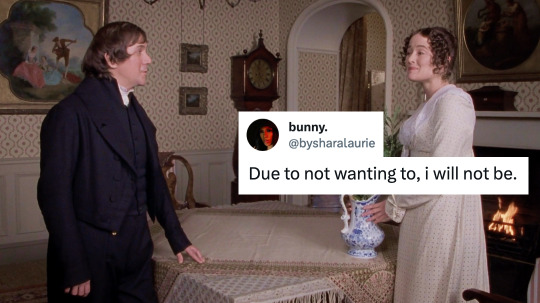
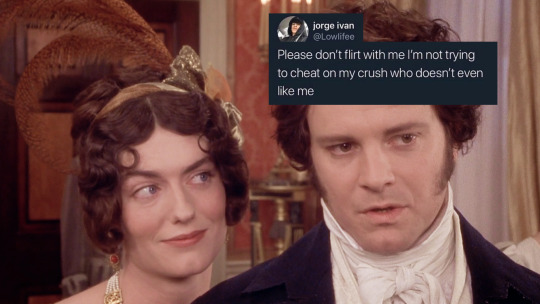

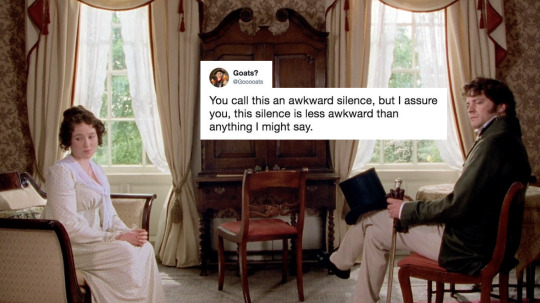
Pride and Prejudice 1995 text posts, part 1 of ?
More: Sense and Sensibility 1995 text posts | Northanger Abbey 2007 text posts | Emma. 2020 text posts
6K notes
·
View notes
Text

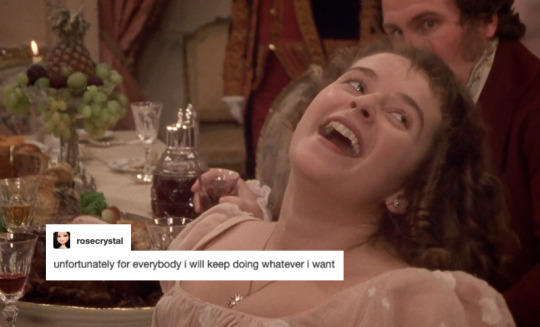


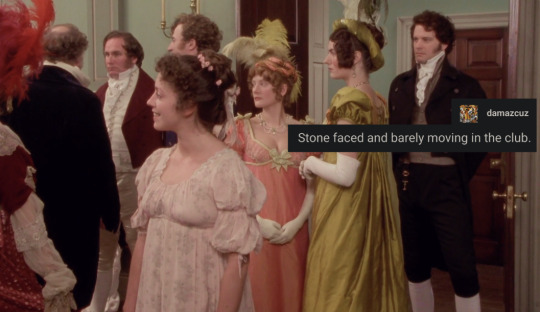
Pride and Prejudice 1995 text posts, part 3 of ?
More: Sense and Sensibility 1995 text posts | Northanger Abbey 2007 text posts | Emma. 2020 text posts
2K notes
·
View notes
Text
Sir Walter Elliot, man who would use moisturizer and have a 10 step skin care routine. You would have loved the anti wrinkles straw.
128 notes
·
View notes
Text
Trippy things happen to your brain when you consider that The Force in Star Wars is most often used to manipulate the forces of gravity, making the name a literal pun, then add on the completely unrelated things Force users can do like seeing just far enough into the future to block blaster bolts with a lightsaber, and eventually come to the conclusion that the magic system in Brandon Sanderson's Mistborn series is essentially a better, more detailed and well thought out treatment of the concept of The Force. 😂😂😂
5 notes
·
View notes
Text
Something I love about how Pride and Prejudice is told through an omnipresent narrator, aside from the witty remarks and insight into other characters it allows even though it's usually focused on Elizabeth, is how it plays on the audience's own prejudices and assumptions.
The narrator tells us very early on, chapter 4, that Darcy is "haughty, reserved, and fastidious, and his manners, though well-bred, were not inviting." We've already seen that when we meet him the previous chapter, and will see more of it in those following. But it's the readers, along with Elizabeth, who take that observation as not only a list of flaws (despite only the first actually being negative) but presumes even more damaging flaws must be attached to it. Darcy can be off-putting, especially so in the setting we meet him in: he dismissed Elizabeth within earshot of her, didn't engage with people attempting to converse with him, etc. It's easy to assume the worst of him in a world so driven by social niceties, and because we follow Elizabeth, who is so lively and playful amidst the rules which govern society. Elizabeth thinks he's bad tempered? It would make sense - he hasn't shown consideration for others much socially, why would he care when he's angry? He acted from resentment and jealousy and went against his father's will? That's not such a jump after the conclusion of a bad temper, his own acknowledgement of implacable resentment, and evidence of pride. The awareness of one offensive trait so naturally leads to prejudice against it, that we easily assume still worse qualities must exist. We are as mistaken as Elizabeth.
Even the idea that 'No, Darcy was never haughty or rude, he was just shy and misunderstood, the narrator is wrong' is just magnifying that prejudice. Yes, we do find out later that Darcy is not at ease among strangers, and was always intrinsically good; his morals and core values meant he was never as bad as Elizabeth believed. But that doesn't mean he was without flaws, and it's so fascinating that some analysis of his character seek to completely remove the negative traits which he eventually overcame after acknowledging them in himself. The logic seems to be that they feel if he had them in the start that he isn't actually such a good person. It's just another example of being so prejudiced against certain flaws that it's impossible for some people to reconcile that there doesn't have to be more serious failings attached, and someone can still be a good person despite being arrogant and not always nice. It's, ironically, being prejudiced in the exact same way that Elizabeth was at the start of the novel. It's amazing that Jane Austen was able to tap into that aspect of human nature so deftly, and invoke in both in her main character, and readers to this day.
Now, of course, the story is so well known it's rare for anyone to read it blind, so it's less likely anyone will be unaware of Darcy's good qualities despite first seeing his worst. Even if they do, Pride and Prejudice has become so genre defining that new readers who are the slightest bit genre savvy will be more aware than contemporary audiences were. But even if we know the story it's still so understandable why Elizabeth feels the way she does. We see what she sees and feel her conclusions make sense. Just as, even though the narrator tells us Darcy is starting to catch feelings for Elizabeth, we fully comprehend her not noticing and believing there's a mutual dislike. And though that is concrete evidence of Elizabeth not reading Darcy and his motives correctly, we are still so sympathetic of the basis of her prejudice that her continued belief in Darcy's lack of virtues makes sense from her point of view. We can see, as she later will, that she takes it too far, and should have noticed evidence to the contrary, but her prejudice against him based on his early behaviour and her pride at reading people correctly is so understandable.
Basically, in a story about the characters' pride and prejudices, I love, love, LOVE how the narrator's voice brings out those same traits in readers the exact same way we see it presenting in Elizabeth. We're all on that journey with her, and we can likewise learn the same lessons about ourselves as she does. Pride and Prejudice feels timeless, because even though society and thus the nuance changes, the book is about human nature, and that remains essentially the same.
163 notes
·
View notes
Text
It's not for nothing that Jane Austen believed she'd created a main character she thought no one but herself would like very much. 😅
Emma is a commentary on self-development in someone who, on the surface, seems like she's already achieved perfection. Jane Fairfax and Mrs. Elton are held in front of Emma as mirrors for her to examine herself in and decide which direction she truly wants to take herself as a person. Will she continue in her present delusions of personal superiority and become exactly like Mrs. Elton, the woman she despises for her open pretension? Or will she admit she is flawed and cultivate the good parts of her heart that would lead her to being more like Jane Fairfax, a woman she has long told herself she ought to befriend but avoided because she doesn't like the reminder that she hasn't been as dedicated to improving herself as Jane has.
Enter Mr. Knightley, who has cared genuinely about Emma for decades and is the only one who sees her truly, without the blinders of supposed perfection to misdirect him. He is also the only one blunt enough to call her out on her behavior. It is the triumph (and frankly the miracle) of the novel that his refusal to be anything less than honest with Emma about her flaws didn't result in her despising him for life. Instead they fall in love, and I think it's not an exaggeration to say that their marriage is probably the most emotionally and intellectually harmonious one in the years beyond the novel. They have always understood each other. He has always encouraged her to do the hard thing and become the best version of herself, even at risk of pushing her away from him, and she justifies his faith in her good heart and intelligent mind by choosing to start down the road to becoming the best version of herself possible.
It may not have the flash of modern romance novel plots, but Jane Austen wasn't writing romance novels. She was writing contemporary social commentary and satire, expecting better of society around her and giving people a roadmap to follow through her characters.
Least Exciting Austen Pairing
The relationship between Emma and Knightley has always come off as less passionate to me. I think one of the reasons is that they’ve known each other for so long and are already incredibly comfortable with each other. But there also isn’t any risk or sacrifice as there is with all Jane Austen’s other heroines. Edward defies his family to marry Elinor, Dacry goes against family expectations to marry the portionless Elizabeth, Edmund marries his poor cousin and originally his father was dead set against that happening; Henry Tilney goes against his father’s mercenary schemes; and Anne Elliot marries down rank wise and Wentworth marries down in fortune. Emma and Knightley is the only marriage that makes complete practical sense.
In fact, there is basically no one else either Emma or Knightley can marry. Frank Churchill is the only acceptable choice for Emam, but she can’t leave home which makes the alliance impossible. Jane Fairfax is basically the only option presented for Knightley that is even half-acceptable, though she has no fortune. I think the story would be far more romantic if Knightley went for Jane and Emma defied her father to fight for Frank, but of course, that story is happening! Frank defies his family when he proposes to Jane and Jane marries high despite her poverty. The romantic story is not experienced by the main characters.
So instead you have a main character match that is boring and predictable. The prom king marrying the prom queen. Knightley is the richest single man in town (besides Mr. Woodhouse) and he marries the richest single woman in town. It’s so obvious! And if Mr. Woodhouse wasn’t so insanely set in his ways and anxious, there would be zero opposition. I’m sure when word got around town, the residents of Highbury were like, “Yeah, I’m only surprised that didn’t happen 3 years ago. What took them so long?”
Emma and Knightley are dull. Sorry guys.
176 notes
·
View notes
Text
How much do you know about the context of Jane Austen's life and the time she was writing in? I think it would enhance your experience if you understood what many people don't... that Jane wasn't writing "quintessential romance" novels. She was writing social commentary and satire that was contemporary to society as she experienced it, and the love story plots are merely part of the fabric of life because so much of a woman's security and prosperity was tied up in her choice of husband at the time.
If you want to know more, I highly recommend checking out authors like Rory Muir for a better look at the time period.
My personal opinion: Darcy and Elizabeth both choosing to see their own faults and try to improve in them is part of the social commentary because Jane wrote her best lead characters as examples of the behavior standard to which she wanted to hold society. She wanted to expect better of people—especially men—and showed what better could look like through her stories.
Got back into reading (reasonable books that are not romance-centred)
I started off with the basic of the basics, Pride and Prejudice.
I began my journey with Jane Austen's "Pride and Prejudice" with high expectations, influenced by numerous glowing reviews. Unfortunately, these high hopes led to a sense of underwhelm as I delved into the novel. While I made an effort to appreciate the distinct style and tone of Austen's writing, I ultimately found the book to be quite dull.
Many would categorize "Pride and Prejudice" as a quintessential romance novel, yet the romantic elements felt bland and unconvincing to me. I would rate the romance aspect a solid zero.
I understand that readers are encouraged to read between the lines and grasp the subtleties and implications beyond the explicit narrative. However, I struggled to find the story engaging or realistic. For instance, the depiction of snobbish characters being called out and subsequently changing their ways seemed far-fetched. In reality, how often do we see individuals from privileged backgrounds, like Mr. Darcy, genuinely transform their attitudes? This isn't reality so I blame no one, to be honest.
That said, I found Elizabeth Bennet to be the most relatable and likable character. She stood out for her independent mind and her willingness to challenge societal norms. Despite this, she, too, was not immune to the general tedium that I felt permeated the novel.
#jane austen was writing social commentary and satire not romance novels#the regency romance subgenre sprang into being because modern writers couldn't copy her contemporary social commentary technique#but her characters and their romances were too beloved not to try and copy the one element that could be copied#pride and prejudice#jane austen#geneva michaels opinions
3 notes
·
View notes




